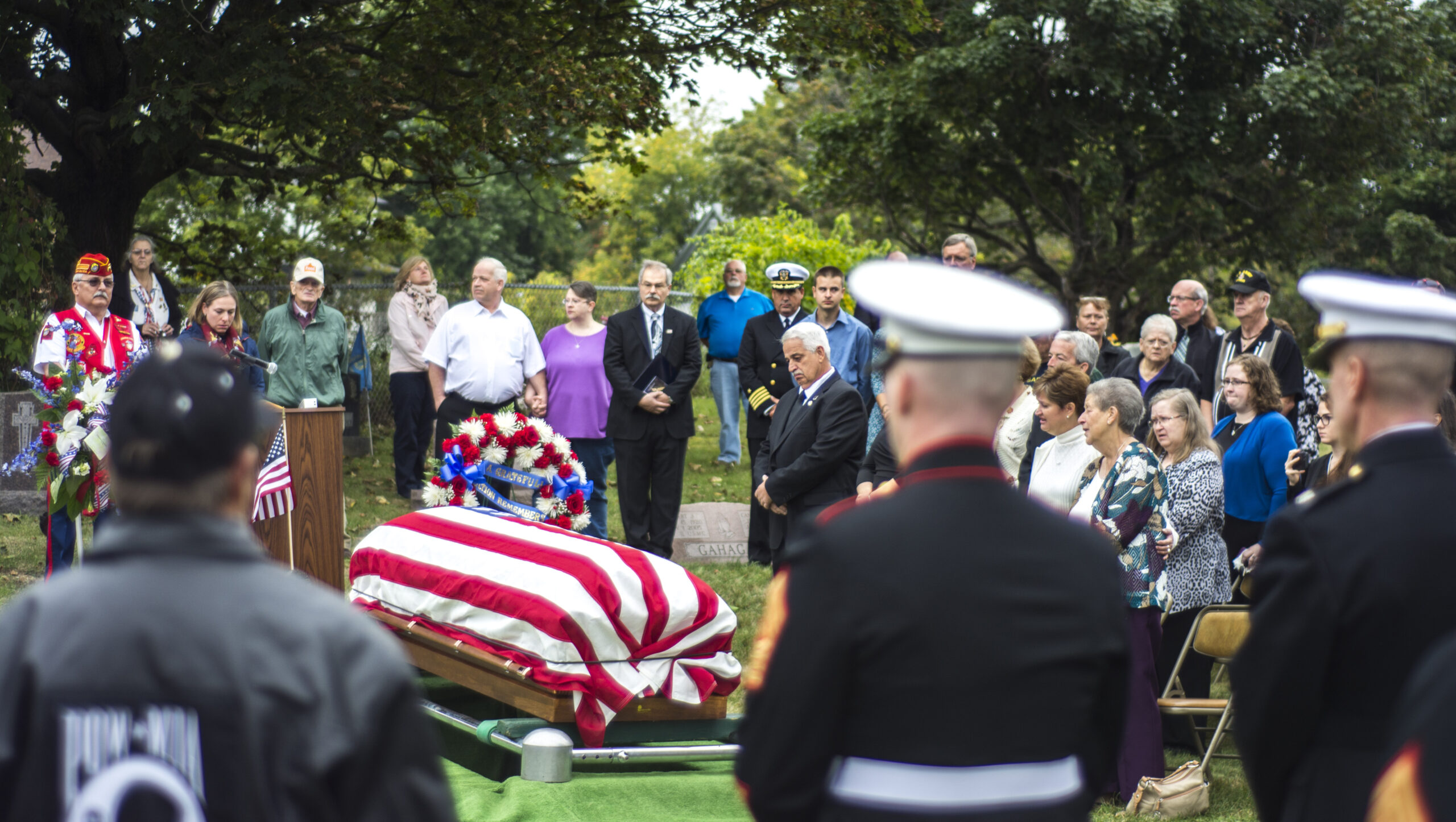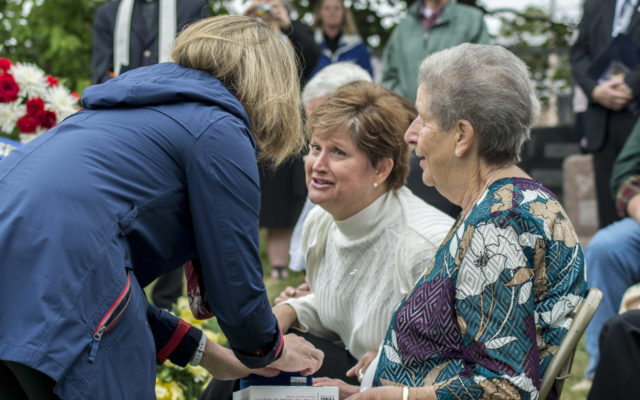
CARIBOU, Maine — More than 100 people gathered Monday for the long overdue funeral service for World War II Pvt. Alberic Blanchette, whose remains were returned home to Caribou 74 years after he was killed in battle on a remote Pacific island.
Alberic, or “Brick” as he was known to family and friends, died at the age of 19 during the Battle of Tarawa, a three-day conflict on the Tarawa Atoll in the Gilbert Islands in November 1943.
Family members flew up from various parts of the country to see Blanchette laid to rest in his hometown of Caribou at the Holy Rosary Cemetery, which is within walking distance of his childhood home.
- Members of WWII Pvt. Alberic Blanchette’s family flew up from Florida, Louisiana, and Mississippi to attend his funeral service in Caribou on Sept. 18. On Sunday, from left, Blanchette’s niece Julie Rogers of Mississippi, his sister Louann Rogers of Louisiana, nephew Clement McDonald and his wife Susan McDonald of Florida, gathered at the Hampton Inn in Presque Isle to share stories about Blanchette and talk about the closure they felt after his remains finally were identified by DNA. (Christopher Bouchard)
Blanchette’s sole surviving sister, Louann Rogers, 79, who flew from Louisiana for the funeral, said she only has two memories of “Brick,” as she was much younger than he was.
“He would put me on his shoulders, hold my feet with his hands, and ride me on his bicycle all over town,” Rogers said, recalling her earliest memory of her older brother. “My mother would be on the front porch, she always wore white nurses shoes and a big apron, and she’d be hollering, ‘Don’t you drop her.’ And he’d say, ‘I won’t, mom.” Then he’d take off and she’d be pacing on the porch.”
“Brick” always brought her home safely, she said.
Her only other memory is of Blanchette’s departure. According to Rogers, he was wearing a “maroon basketball sweater with a big ‘C’ on it,” a tweed coat, and a Stetson cowboy hat.
“He kissed mom and dad, then came to me,” Rogers said. “He put me on the edge of the table and said, ‘Now you take care of mom and dad, because Bricky will be back in a little bit,’ and told me to be good.
It would be the last time she or the family saw Blanchette.
While Rogers doesn’t have any other memories of her brother, she did remember their mother, Albertine (Sirois) Blanchette, telling a story before she died about how Pearl Harbor had inspired Brick to join the military at the age of 17.
“He wanted to go into the service so bad after Pearl Harbor broke out,” Rogers recalled. “Mom didn’t want to sign the papers and told him he was too young, so he looked at Daddy and said, ‘If you don’t let me go, I’m going to drink every night. I will not do anything but drink.’ And he did.”
Rogers said their parents eventually gave in and signed the papers, allowing Blanchette to become a Marine.
- Maine Bureau of Veterans Services Director Adria Horn, left, presents WWII Pvt. Alberic Blanchette’s niece Julie Rogers (center) and his sister Louann Rogers (right) with a state of Maine flag and other items to recognize his service, during a funeral ceremony Monday at the Caribou Holy Rosary Cemetery. (Christopher Bouchard)
Blanchette and more than 1,000 other Marines were killed in the Battle of Tarawa, but it was only in 2016 that the federal Defense POW/MIA Accounting Agency began exhuming some of the bodies that had been buried on the island. It was in July this year that Blanchette’s remains finally were identified by DNA.
Arrangements were made to return the body from Hawaii where the remains were being kept pending identification to Caribou to be buried next to his parents. On Friday, veterans and police escorted the remains into Maine and across the state to Caribou.
His service and sacrifice have not been forgotten, and on Monday, he was buried with full military honors.
Adria Horn, director of the Maine Bureau of Veterans’ Services, spoke of Blanchette’s military service during the funeral ceremony held graveside at the Holy Rosary Cemetery in Caribou.
“I would like to extend my sincere condolences to the family of Private Blanchette,” said Horn. “It is an honor to be asked to speak today. Although 74 years have passed since the Battle of Tarawa, the service of Private Blanchette has not been forgotten.”

The federal Defense POW/MIA Accounting Agency in July identified the exhumed remains of WWII Marine Pvt. Alberic “Brick” Blanchette of Caribou, who was killed at the Battle of Tarawa in the Gilbert Islands in November 1943. Family members are arranging a burial ceremony in his hometown on Sept. 18.
(Aroostook Republican file photo)
Horn presented Blanchette’s family with a state of Maine flag that had been flown over the Capitol, a Gold Star Award with his name inscripted on the back, a gold star lapel and pin, and a certificate that is presented to all World War II veterans for their service.
“Private Blanchette,” Horn concluded, “we are so grateful, honored, and humbled to have you home.”
Clement McDonald, Blanchette’s nephew, who sent the DNA sample to the military that ultimately led to his uncle’s remains being identified, oversaw “Brick’s” final arrangements.
McDonald, whose mother Iris was Blanchette’s sister, said the feeling is “bittersweet.”
“I got to fulfill my promise to my mother,” McDonald said. “He got to come home.”
Louann’s daughter Julie Rogers, who flew up from Mississippi, said she was impressed that technology “has come so far” as to be able to identify her uncle’s remains after all these years.
“I can’t believe they kept his remains for all that time,” Julie said. “They didn’t know about DNA back then. It was a miracle. I was happy he was found because I know my grandmother mourned all her life not knowing where he was. I’m glad he can be put by her. That was her main thing, to have him come home.”
To anyone with a relative who still is listed as missing in action, Blanchette’s family said it’s important to not give up.
“My grandma (Blanchette’s mother) always had it in her mind that she was going to find him one day,” Julie said. “Don’t give up.”
Rogers recalled that, after her brother left on the train, her mother held onto the hope that he would someday return.
“Mom would hear the sound of the train at night and say, ‘Maybe he’s coming in on this one,’” Rogers said. “She always stayed up until the ten o’clock train came in. She never went to bed before that.”









